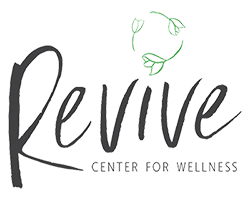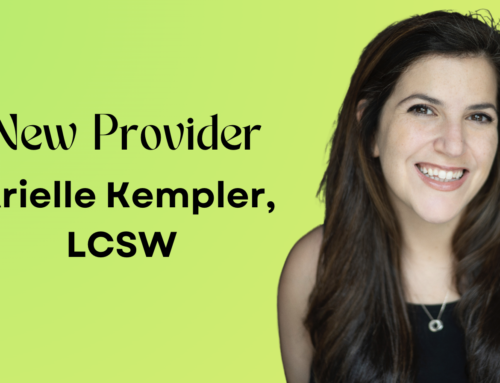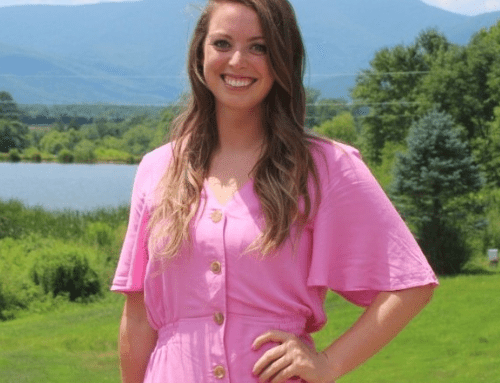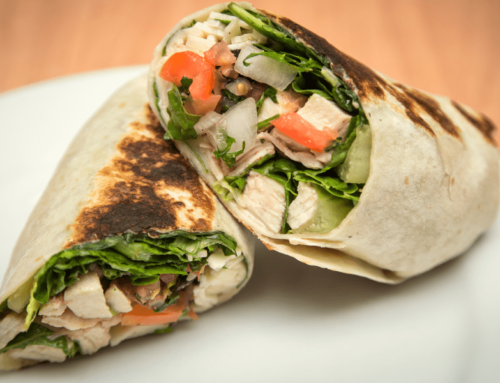Meet Revive’s NEW Dietitian, Elisabeth DiDonato!

As many of you know, Revive has a variety of mental health practitioners. And now, we welcome a new addition to our “group of passionate female wellness professionals,” but she is not a therapist. Elisabeth DiDonato is a Registered Dietitian Nutritionist (RDN) and a Certified Dietitian Nutritionist (CDN). Wow, right!?
When announcing Elisabeth’s integration into the Revive team, Amy Albero, Founder of Revive, wrote, “Elisabeth’s background, education, passion, and energy are such a great fit for our team, and I am looking forward to collaborating with her in our shared mission to support clients through holistic wellness!”
As a lover of nutrition and all things health, I was elated to have the opportunity to meet with Elisabeth and ask her some questions about her work in the field. Check out our interview!
CV: Can you tell us about your background and how you got into the field?
ED: I started my career in nutrition and dietetics from transitioning between my bachelor’s degree in Kinesiology and then going into a master’s program in nutrition and dietetics, and I received that through a coordinated and accelerated program. I started off my career as a dietician working in a residential treatment center, which is where I worked closely with adolescents ranging from, actually, age 12 to 18, working through different mental health conditions, as well as disordered eating and eating disorders. I worked there for a little over a year and then transitioned into a new position working with different chronic illnesses, GI diseases, autoimmune conditions and other diseases. The reason why I actually wanted to go this route is just from personal health experiences. So, I’ve been battling different autoimmune conditions and different health-related diseases for 18 plus years, so that really brought me into the realm of nutrition and holistic wellness, which is why I’m here today. I fully believe that when you go through it personally you have that different connection and you can build that personal rapport with your patients as well as a professional rapport.
“I fully believe that when you go through it personally you have that different connection and you can build that personal rapport with your patients as well as a professional rapport.”
CV: How would you describe your approach?
ED: Going off of what I previously mentioned before about my own personal health journey, I really take the approach of using food as a form of medicine. That is key to the way that I go about my sessions and my background, as well. So, I really, like I said, prioritize using food as well as your sleep schedule, the people you surround yourself with, the things that you watch on social media or on TV or different programs you watch, as well as different things that you read. All of these things play a key role in your overall health and wellness, so I really prioritize a holistic way to look at the person, which really just means that everything is connected. So, all of these things play a role and it’s not just one thing. It’s not just looking at the food that you’re eating but it’s what else are you consuming on a day-to-day basis?
CV: What can a new client expect when they come to see you?
ED: A first session with me is really just going to be me getting to know you. So, Why are you here? What are you looking for? What are your goals? All of those different types of things. What’s your past relationship with food? What’s your current relationship with food? We kind of dive deep into that and we might do this for the next few sessions. It might just take one session, but it’s really just me getting to know you, us getting to know each other, and really really building that foundation, that rapport, how we can be a good fit for each other.
CV: What do you think is important for people to understand that’s different about your work as a holistic dietitian?
ED: As a holistic dietitian I really emphasize the importance of looking at the whole person, so really understanding that everything is connected in the body and it’s not just based on what we’re consuming via food and nutrition, it’s also what we are consuming through social media and through TV platforms, what we’re consuming based on what we’re reading physically and on our phones. Also, different environmental toxins or what’s in our house and what we’re using to clean. All these different things play a really big role in our body and what can manifest as different diseases or symptoms and a relationship we may have with our body, etc. So, I really focus on the whole person and when I look at the whole person, I really try to figure out how we can get to that root cause. I really focus on “root cause medicine” and peeling back the layers of an onion to get to the nitty-gritty versus just meal plans and dietary changes.
“ I really focus on “root cause medicine” and peeling back the layers of an onion to get to the nitty-gritty versus just meal plans and dietary changes.”
CV: How do you incorporate your work into your own life?
ED: I wholeheartedly believe that “every coach needs a coach” so, really trying to use what I preach and use it for myself. I’ve worked with plenty of dietitians before, I’ve worked with wellness professionals before and just, again, focusing on what I preach for myself, I really try to focus on what makes me feel good. Everybody has their own individualized plan, I’d say because everybody’s body is different. We’re all unique, we’re all individuals and so what works for me might not work for you or might not work for the next person and so on. I’m really focusing on what does my body need in this given moment and how can I give that to myself? And, also, understanding that everything isn’t just food, right? So, it’s what’s going to make me feel good with what I’m watching or who I’m hanging out with or what I want to do with my time. Do I want to be with a big group of people? Do I want to be by myself? I really really do this for myself as much as I “preach it.”
CV: Any general suggestions you can give to our readers/viewers?
ED: One big tip that I suggest you all follow is never drink coffee on an empty stomach. The reasoning behind this is, one, coffee is not breakfast, right? We never want to just have a liquid as our breakfast. Number two is, overnight, your body is actually fasting, right? Whether you had dinner late or early, you are going through a fasting state and our stomachs are naturally extremely acidic and so is coffee. So, the first thing we put in our stomach in the morning, we don’t want it to be also extremely acidic, so that will throw our pH balance off. The first thing we want to do in the morning is drink a big glass of water. I typically promote drinking about 16 ounces or so, so that can be one large glass like a mason jar or two smaller glasses of water. We are really trying to get that liquid in your body. Specifically water or even lemon water because lemon actually becomes alkaline when it hits your body. It is acidic when it’s outside but once it hits your body it’s alkaline, so it actually balances that pH in your body. Which, then after having that lemon water, you try to have some type of food so you can have some type of nourishment in your system, then you can follow that up with your coffee. The order of operations I like to emphasize is starting with a big glass of water roughly 16 ounces or so, followed up with your breakfast, and then follow that with your cup of coffee.
CV: What do you focus on during your sessions?
ED: A really big thing that I focus on is that our bodies take time to heal and to become stronger and all that and that we’re not just a band-aid, right? We don’t just want to cover up open wounds and then have them be exposed again. But we really want to try to heal the whole body and this takes a lot of time. So, trying not to put our healing journey on a timeline. I always, always say we never go from point A to point B linearly. But, instead we have constant ebbs and flows, we have peaks and valleys, we might even do loops and things like that. But we’re always progressing in the right direction, we are always moving forward, which is really, really important. But it’s never linear right? We’re always going to have our good days and we’re also equally going to have our bad days and that’s part of the whole process.
CV: What is one thing you like to focus on for yourself?
ED: One big thing that I really like to focus on for myself is grounding techniques. I really emphasize grounding myself because especially with the work that I do and the people that I communicate with and that I’m trying to heal others, I equally have to heal myself and to make sure that I’m in a space where I can hold space for other people. So, I really like to ground myself, whether that’s with meditation or walking. I think sun exposure is extremely important, so really getting outside feeling that fresh sunlight on my face, whether that is first thing in the morning or right before the sun comes down. I think that does wonders for the body. As well as, maybe getting my feet in more grass or just walking. All these different grounding techniques, breathing exercises, I think this is really important for my body to function as best as it can and that way I can re-ground myself, especially in between clients so I can hold as much space and be as present as I can for each of my patients going forward.
“Everybody has their own individualized plan, I’d say because everybody’s body is different. We’re all unique, we’re all individuals and so what works for me might not work for you or might not work for the next person and so on.”
CV: Anything else you want the Revive community to know about you?
ED: One big thing that I emphasize when I work with patients is reminding you that, you know you are a person here that’s trying to heal and that I look at you as an individual and that I am not going to just prescribe you a specific diet plan or give you a meal plan and focus on one thing in the body. Instead, I’m going to really try to advocate for you as a whole. Again, empathizing with the holistic approach and making sure that I can really give you all the best treatment that I possibly can and that you don’t have to follow every diet that you see trending on social media and all that. But instead we can focus on what makes you feel the best and that makes you feel whole and that really helps solidify your healing journey.
Interested in speaking with Elisabeth? Schedule your free 15-minute consultation here!
LIKE THIS CONTENT?
Subscribe to our Newsletter and our Social Media pages and get an alert when new content is available!
LOCATIONS
Stamford, CT
37 Glenbrook Road, Suite 3
Norwalk, CT
148 East Avenue, Suite 2A
FLEXIBLE HOURS
Regardless of your schedule, we can find times that work for you.





